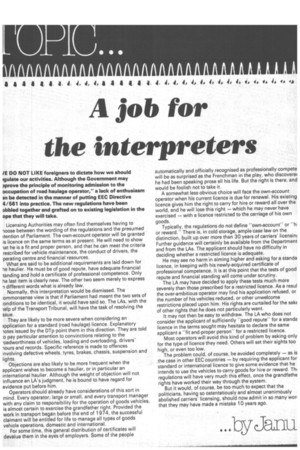A job for the interpreters
Page 71

If you've noticed an error in this article please click here to report it so we can fix it.
ilE DO NOT LIKE foreigners to dictate how we should tgulate our activities. Although the Government may oprove the principle of monitoring admission to the occupation of road haulage operator," a lack of enthusiasm an be detected in the manner of putting EEC Directive 4/561 into practice. The new regulations have been obbled together and grafted on to existing legislation in the ope that they will take.
Licensing Authorities may often find themselves having to loose between the wording of the regulations and the presumed itention of Parliament. The own-account operator will be granted is licence on the same terms as at present. He will need to show -let he is a fit and proper person, and that he can meet the criteria rescribed for vehicle maintenance, the conduct of drivers, the perating centre and financial resources.
What are said to be additional requirements are laid down for le haulier. He must be of good repute, have adequate financial tending and hold a certificate of professional competence. Only he last item is clearly new. The other two seem merely to express different words what is already law.
Normally, this interpretation would be dismissed. The :ommonsense view is that if Parliament had meant the two sets of :onditions to be identical, it would have said so. The LAs, with the ielp of the Transport Tribunal, will have the task of resolving the ssue.
They are likely to be more severe when considering an ipplication for a standard (road haulage) licence. Explanatory lotes issued by the DTp point them in this direction. They are told :o pay particular attention to convinctions relating to the -oadworthiness of vehicles, loading and overloading, drivers' lours and records. Specific reference is made to offences nvolving defective wheels, tyres, brakes, chassis, suspension and lights.
Objections are also likely to be more frequent when the applicant wishes to become a haulier, or in particular an international haulier. Although the weight of objection will not influence an LA's judgment, he is bound to have regard for evidence put before him.
Operators should already have considerations of this sort in mind. Every operator, large or small, and every transport manager with any claim to responsibility for the operation of goods vehicles, is almost certain to exercise the grandfather right. Provided the work in transport began before the end of 1974, the successful claimant will be entitled for life to manage all types of goods vehicle operations, domestic and international.
For some time, this general distribution of certificates will devalue them in the eyes of employers. Some of the people automatically and officially recognised as professionally compete will be as surprised as the Frenchman in the play, who discoveret he had been speaking prose all his life. But the right is there, and would be foolish not to take it.
A somewhat less obvious choice will face the own-account operator when his current licence is due for renewal. His existing licence gives him the right to carry for hire or reward all over the world, and he will lose this right — which he may never have exercised — with a licence restricted to the carriage of his own goods.
Typically, the regulations do not define "own-account" or "hi or reward." There is, in cold storage, ample case law on the distinction, built up over more than 30 years of carriers' licensint Further guidance will certainly be available from the Department and from the LAs. The applicant should have no difficulty in deciding whether a restricted licence is adequate.
He may see no harm in aiming higher and asking for a standa licence, in keeping with his newly-acquired certificate of professional competence. It is at this point that the tests of good repute and financial standing will come under scrutiny.
The LA may have decided to apply these tests much more severely than those prescribed for a restricted licence. As a resul the over-ambitious operator may find his application refused, or the number of his vehicles reduced, or other unwelcome restrictions placed upon him. His rights are curtailed for the sakE of other rights that he does not particularly want.
It may not then be easy to withdraw. The LA who does not consider the applicant of sufficiently "good repute" for a standa licence in the terms sought may hesitate to declare the same applicant a "fit and proper person" for a restricted licence.
Most operators will avoid this kind of problem by asking only for the type of licence they need. Others will set their sights too high, or even too low.
The problem could, of course, be avoided completely — as is .the case in other EEC countries — by requiring the applicant for standard or international licence to give some evidence that he intends to use the vehicles to carry goods for hire or reward. Thi regulations will have very much this effect, once the grandfathe rights have worked their way through the system.
But it would, of course, be too much to expect that the politicians, having so ostentatiously and almost unanimously abolished carriers' licensing, should now admit in so many wor, that they may have made a mistake 10 years ago.
. by Jam
















































































































